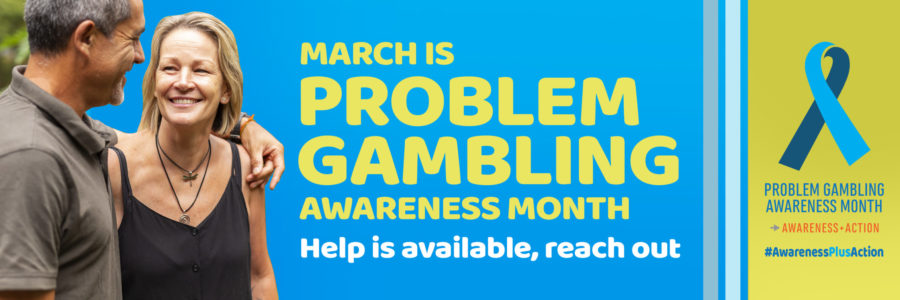
“The Hidden Addiction”. Experts often refer to gambling disorders this way. There are two main reasons for this. First, there are no physical signs that someone is gambling too much. Substance use disorders cause changes to a person’s physical appearance and health. Aside from appearing run-down or tired, gambling usually has no such effects. Second, while substance use disorders (SUD) get a lot of media attention, gambling disorders (GD) get relatively little in the way of coverage or grassroots efforts. Even though alcohol, drugs, and gambling re-wire almost identical regions of the brain, GD remains a largely invisible problem.
National Problem Gambling Awareness Month occurs each March in hopes of revealing the issues around gambling disorders found in all communities in the U.S., as well as highlighting solutions and services. The 2021 theme is “Awareness + Action” and goals are to:
- Increase public awareness of problem gambling and the availability of prevention, treatment & recovery services.
- Encourage healthcare providers to screen clients for problem gambling.
The National Council on Problem Gambling offers answers to the following Frequently Asked Questions on gambling disorders.
What are Gambling Disorders?
Problem Gambling/Gambling Disorders/Gambling Addiction includes all gambling behavior patterns that compromise, disrupt or damage personal, family or vocational pursuits. The symptoms include:
- Increasing preoccupation with gambling
- A need to bet more money more frequently
- “Chasing” losses (betting even more to try to recoup previous losses)
- Restlessness/irritability when trying to stop
- Loss of control manifested by continuation of gambling despite mounting, serious, negative consequences
- In extreme cases, problem gambling can result in financial ruin, legal problems, loss of career and family, or even suicide ($7 billion social cost in America alone!)
Use our screening tool with customized results if you’re concerned about yourself or someone else.
Isn’t Problem Gambling just a financial issue?
No. Problem gambling is a behavioral health issues that has financial consequences. If you pay all the debts of a person affected by problem gambling, the person still has a gambling problem or gambling disorder. The real issue is that they have an uncontrollable obsession with gambling caused by a physical re-wiring of the brain. The brain’s reasoning center becomes smaller and less powerful, and new connections are built in the pleasure center, making it very hard to stop gambling without help.
Who is at Risk?
Anyone who gambles can develop problems. Therefore, it is important to be aware of the risks and to gamble in a responsible way,  if you choose to gamble. When gambling behavior interferes with finances, relationships and the workplace, a serious problem already exists. Some people have increase risks for GD, including those with other mental health issues, those with higher levels of impulsivity, youth under age 25, and those with family histories of any type of addiction.
if you choose to gamble. When gambling behavior interferes with finances, relationships and the workplace, a serious problem already exists. Some people have increase risks for GD, including those with other mental health issues, those with higher levels of impulsivity, youth under age 25, and those with family histories of any type of addiction.
How Widespread are Gambling Disorders in the U.S?
2 million U.S. adults (1%) are estimated to meet criteria for severe gambling disorders each year. Another 4-6 million (2-3%) would be considered to have mild or moderate gambling problems; that is, they do not meet the full diagnostic criteria for gambling addiction but meet one of more of the criteria and are experiencing problems due to their gambling behavior. The percentage of youth in each category is higher–according to the American Psychiatric Association, 10–15% of young people asked show problem gambling behaviors, and 6% of the teens who have tried gambling meet the criteria for a gambling disorder.
Powerful Prevention Strategies
Many of the prevention strategies for substance misuse also work to prevent youth gambling. This is because evidence-based prevention, in addition to education, helps individuals build up the coping skills needed to withstand life’s ups and downs without turning to alcohol, other drugs, or gambling. These soft skills or social & emotional skills include the ability to navigate friendships, to name one’s feelings, to successfully manage anger, fear and sadness, to make good choices, and to manage oneself responsibly.
Additional education is needed so that people understand the tactics that gambling outlets use to entice gameplay, how probability works (not usually in favor of the player!), and common elements of magical thinking during gambling, such as the notion that a slot machine, lottery outlet, or sports betting strategy is more likely to pay out after a long string of losses.
Let Us Be Your Guide
Compass Mark offers many effective prevention programs in Lancaster, Lebanon, and Chester Counties for youth , as well as presentations on problem gambling, and information & referral services for families affected by gambling disorders. This Hidden Addiction is familiar to us, and we’ll help shed light on individual and community solutions.
717.299.2831 / info@compassmark.org / web chat on compassmark.org